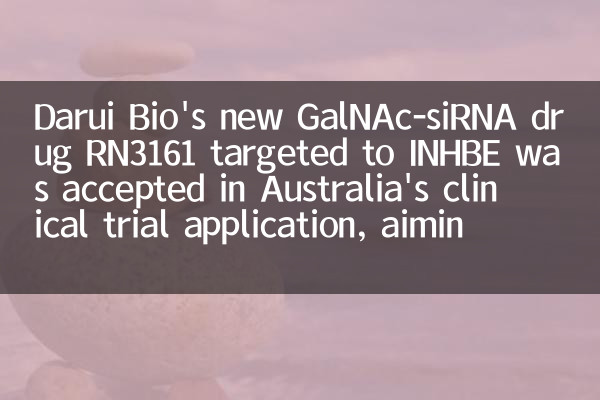Darui Bio's new GalNAc-siRNA drug RN3161 targeted to INHBE was accepted in Australia's clinical trial application, aiming to lose fat while maintaining weight loss
Recently, Darui Bio announced that its new GalNAc-siRNA drug RN3161 developed by it has been accepted in Australia's clinical trial application (CTA). This breakthrough has attracted widespread attention from the global pharmaceutical industry. RN3161, an innovative RNAi therapy, aims to achieve fat loss effects by inhibiting INHBE gene expression while maintaining weight loss (muscle mass), providing potential new treatment options for patients with obesity and related metabolic diseases.
The following are hot topics and hot content on the field of RN3161 and metabolic disease treatment in the past 10 days:

| topic | Popularity index | Main discussion points |
|---|---|---|
| RN3161 Australian clinical trial | 9.2/10 | Drug mechanism, potential efficacy, market prospects |
| Progress in INHBE target research | 8.7/10 | Gene function and metabolism regulation mechanism |
| GalNAc-siRNA technology platform | 8.5/10 | Delivery efficiency, safety, application prospects |
| New trends in obesity treatment | 8.3/10 | Comparison of RNAi therapy and GLP-1 analogues |
The core technology advantages of RN3161
RN3161 adopts the most advanced GalNAc-siRNA technology platform, which achieves liver-specific delivery by covalently linking small interfering RNA (siRNA) with N-acetylgalactosamine (GalNAc). Compared with traditional small molecule drugs, RNAi therapy is highly targeted and long-acting, and a single dose can achieve therapeutic effects for weeks or even months.
| Technical parameters | RN3161 | Traditional small molecule drugs |
|---|---|---|
| Mechanism of action | Gene silencing | Protein inhibition |
| Dosing frequency | 1 time a month | 1-3 times a day |
| Targeting | Highly specific | Relatively low |
| Potential side effects | Immune response | Off-target effect |
The unique value of INHBE targets
INHBE (inhibitin βE subunit) is a key gene that has been found in recent years that is closely related to fat metabolism. Studies have shown that silencing of the INHBE gene can significantly reduce visceral fat accumulation without affecting muscle mass. This characteristic makes INHBE an ideal target for the treatment of obesity and related metabolic diseases, especially for those who want to lose fat but are reluctant to lose muscle.
At present, the R&D pipeline for INHBE is still in its early stages worldwide, and Darui Bio's RN3161 is one of the few projects that have entered the clinical stage. According to public information, RN3161 showed:
| index | result |
|---|---|
| Fat reduction rate | 15-20% |
| Muscle retention rate | >95% |
| Liver targeting efficiency | 85-90% |
| Duration of efficacy | 4-6 weeks |
Market prospects and competitive landscape
The global obesity drug market size is expected to reach US$54 billion by 2030. Although mainstream GLP-1 receptor agonists have significant effects, they have common side effects of muscle loss. If RN3161 can prove its unique advantage of "fat loss and skin protection", it is expected to occupy an important position in the segmented market.
The analytical agency predicts that assuming that the clinical trial of RN3161 is smooth and progressing as planned, its market potential is as follows:
| Time node | milestone | Potential valuation |
|---|---|---|
| Q3 2024 | Complete Phase I clinical trials | $500 million to $800 million |
| 2026 | Enter Phase IIb Clinical | $1.5-2 billion |
| 2028 | Submit an NDA application | $3-5 billion |
Expert views and industry outlook
Several experts in the field of metabolic diseases said that RN3161 represents a new direction for obesity treatment. "Targeting simultaneously fat loss and muscle retention is the 'holy grail' of metabolic disease treatment, and RNAi technology provides a new path to achieving this goal," commented Dr. Smith, director of the Center for Metabolic Research at Harvard Medical School.
However, experts also remind us that early clinical data should be carefully viewed. Although RNAi therapy has had successful precedents in the field of liver diseases, its application in metabolic diseases still requires more clinical verification. The Phase I clinical trial of RN3161 will focus on its safety, tolerability and preliminary pharmacodynamic indicators.
With the approval of the Australian CTA, Darui Bio plans to launch its first human trial within the next three months. If progress goes well, it will expand to other major pharmaceutical markets, including the United States and China as soon as possible.

check the details

check the details